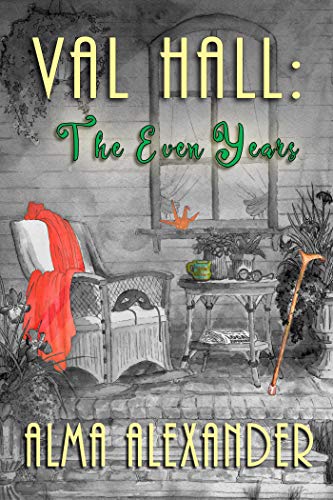![]() Val Hall: The Even Years by Alma Alexander
Val Hall: The Even Years by Alma Alexander
 Val Hall: The Even Years (2020), by Alma Alexander, is a series of linked stories set in a sort of retirement home for gifted or powered people (though only to a certain limited degree). Each story follows a single individual who relates their story to another character, usually sending us back in time to their first usage of their power. As is typical with collections, the stories vary in quality and effect, but Alexander does a nice job with the intriguing premise, offering up several quite moving moments, and the whole work left me looking forward to its follow-up, Val Hall: The Odd Years.
Val Hall: The Even Years (2020), by Alma Alexander, is a series of linked stories set in a sort of retirement home for gifted or powered people (though only to a certain limited degree). Each story follows a single individual who relates their story to another character, usually sending us back in time to their first usage of their power. As is typical with collections, the stories vary in quality and effect, but Alexander does a nice job with the intriguing premise, offering up several quite moving moments, and the whole work left me looking forward to its follow-up, Val Hall: The Odd Years.
Following a prologue that explains where the idea for Val Hall came from, the collection presents eight stories — the final one a “bonus” story from the aforementioned sequel — and then an appendix in the form of several brief Wikipedia “entries” about Val Hall, such as its classification of superheroes, its move to the U.S., and its separation of superheroes and sidekicks.
The prologue, “The One About the Founding” is, I’d say, unfortunately the weakest of the stories, mostly because it feels heavily expository and somewhat stilted. Keep reading, though, because the next one, “The One About the Symphony,” is one of the strongest. It tells the story of Marya Morozova, known as the Little Muse due to her talent of being able to see music “yet unwritten, unborn … in people’s minds and hearts … long before there is anything there for the person who holds it.” The first time her power came to her was when she saw Dimitri Shostakovich and sensed “the connection between the man, the music, the city … [how] it was going to be beautiful, and bad, and bitter, and it was all coming.” What she saw coming, of course, was the notorious siege of Leningrad, where over a million souls perished, and Shostakovich’s brilliant symphony born of the disaster, the one played in the shell of the city by those left of its symphony even as the Germans waited outside its walls. Alexander conveys both the horrific and the inspirational in good measure, making this one of the more effective pieces in the collection.

Alma Alexander
“The One About the Face of God” is also moving, albeit in a quieter sense. In it, Saira Saroyan sees a “countdown” above someone’s head when they’re within 48 hours of their death. What I liked about this piece is how Alexander focuses less on the built-in pathos of seeing someone’s impending death and more on the empathy of the “listener” character for Saira’s isolation. Who, after all, wants to know they only have two days to live? Along with the lovely emotive aspect, there’s also a wonderfully evocative explanation of the power itself when Saira describes what the numbers themselves look like: “They are gold, and they shine, and when they are done they disintegrate, they fall apart, and the fragments come down like a rain of golden confetti. It is actually, it can be beautiful.”
Another favorite is “The One About One More Time” where a wholly unlikable character, Bertrand Ballard, aka The Cardinal, is constantly whining about how he no longer can fly as his red cape, the object that had given him the ability, is ruined. I liked how Alexander shows us another side of the heroes and also one that makes perfect sense. Many of us yearn for the golden days of our youth and none of us could fly; how much worse for those who could? I won’t say more about this one so as not to spoil its effect, but like “Face of God,” it’s a lovely, intimate story of character and empathy.
Val Hall: The Even Years’ other stories were less effective to me, but all are solid enough. The collection as a whole is relatively short, just a bit over 200 pages, so three excellent stories is batting a pretty good percentage. I’m curious to see some more of these character in Val Hall: The Odd Years. Recommended.



Do it! One of the best things I've read in recent years.
This reminds me. I want to read Addie LaRue.
We’re in total agreement David!
I felt just the same. The prose and character work was excellent. The larger story was unsatisfying, especially compared to…
Hmmm. I think I'll pass.